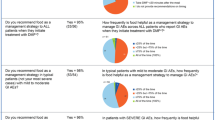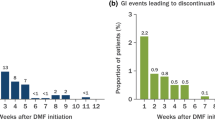Abstract
Delayed-release dimethyl fumarate is an oral disease-modifying therapy that has demonstrated significant efficacy in adults with relapsing–remitting multiple sclerosis. Incidences of flushing and gastrointestinal adverse events are common in the first month after delayed-release dimethyl fumarate initiation. Our objective was to propose mitigation strategies for adverse events related to initiation of delayed-release dimethyl fumarate in the treatment of patients with multiple sclerosis. Studies of individually developed mitigation strategies and chart reviews were evaluated. Those results, as well as mitigation protocols developed at multiple sclerosis care centers, are summarized. Key steps to optimize the effectiveness of delayed-release dimethyl fumarate treatment include education prior to and at the time of delayed-release dimethyl fumarate initiation, initiation dose protocol gradually increasing to maintenance dose, dietary suggestions for co-administration with food, gastrointestinal symptom management with over-the-counter medications, flushing symptom management with aspirin, and temporary dose reduction. Using the available evidence from clinical trials and evaluations of post-marketing studies, these strategies to manage gastrointestinal and flushing symptoms can be effective and helpful to the patient when initiating delayed-release dimethyl fumarate.


Similar content being viewed by others
References
Bar-Or A, Oliveira EM, Anderson DE, Hafler DA. Molecular pathogenesis of multiple sclerosis. J Neuroimmunol. 1999;100(1–2):252–9. https://doi.org/10.1016/S0165-5728(99)00193-9.
Hauser SL, Oksenberg JR. The neurobiology of multiple sclerosis: genes, inflammation, and neurodegeneration. Neuron. 2006;52(1):61–76. https://doi.org/10.1016/j.neuron.2006.09.011.
Goodin DS, Reder AT, Bermel RA, Cutter GR, Fox RJ, John GR, et al. Relapses in multiple sclerosis: relationship to disability. Mult Scler Relat Disord. 2016;6:10–20. https://doi.org/10.1016/j.msard.2015.09.002.
Turpin KV, Carroll LJ, Cassidy JD, Hader WJ. Deterioration in the health-related quality of life of persons with multiple sclerosis: the possible warning signs. Mult Scler J. 2007;13(8):1038–45. https://doi.org/10.1177/1352458507078393.
Devonshire V, Lapierre Y, Macdonell R, Ramo-Tello C, Patti F, Fontoura P, et al. GAP Study Group. The Global Adherence Project (GAP): a multicenter observational study on adherence to disease-modifying therapies in patients with relapsing-remitting multiple sclerosis. Eur J Neurol. 2011;18(1):69–77. https://doi.org/10.1111/j.1468-1331.2010.03110.x.
Biogen. Tecfidera (dimethyl fumarate) delayed-release capsules: US prescribing information. 2017. https://www.tecfidera.com/content/dam/commercial/multiple-sclerosis/tecfidera/pat/en_us/pdf/full-prescribing-info.pdf. Accessed 22 November 2017.
Deeks ED. Dimethyl fumarate: a review in relapsing-remitting MS. Drugs. 2016;76(2):243–54. https://doi.org/10.1007/s40265-015-0528-1.
Kretzschmar B, Pellkofer H, Weber MS. The use of oral disease-modifying therapies in multiple sclerosis. Curr Neurol Neurosci Rep. 2016;16(4):38. https://doi.org/10.1007/s11910-016-0639-4.
Biogen. Tecfidera gastro-resistant hard capsules: EU summary of product characteristics. 2017. http://www.ema.europa.eu/docs/en_GB/document_library/EPAR_-_Product_Information/human/002601/WC500162069.pdf. Accessed 22 Nov 2017.
Kim W, Zandoná ME, Kim SH, Kim HJ. Oral disease-modifying therapies for multiple sclerosis. J Clin Neurol. 2015;11(1):9–19. https://doi.org/10.3988/jcn.2015.11.1.9.
Kita M, Fox RJ, Gold R, Giovannoni G, Phillips JT, Sarda SP, et al. Effects of delayed-release dimethyl fumarate (DMF) on health-related quality of life in patients with relapsing-remitting multiple sclerosis: an integrated analysis of the phase 3 DEFINE and CONFIRM studies. Clin Ther. 2014;36(12):1958–71. https://doi.org/10.1016/j.clinthera.2014.08.013.
Fox RJ, Kita M, Cohan SL, Henson LJ, Zambrano J, Scannevin RH, et al. BG-12 (dimethyl fumarate): a review of mechanism of action, efficacy, and safety. Curr Med Res Opin. 2014;30(2):251–62. https://doi.org/10.1185/03007995.2013.849236.
Fox RJ, Miller DH, Phillips JT, Hutchinson M, Havrdova E, Kita M, et al. CONFIRM Study Group. Placebo-controlled phase 3 study of oral BG-12 or glatiramer in multiple sclerosis. N Engl J Med. 2012;367(12):1087–97. https://doi.org/10.1056/NEJMoa1206328.
Gold R, Kappos L, Arnold DL, Bar-Or A, Giovannoni G, Selmaj K, et al. DEFINE Study Group. Placebo-controlled phase 3 study of oral BG-12 for relapsing multiple sclerosis. N Engl J Med. 2012;367(12):1098–107. https://doi.org/10.1056/NEJMoa1114287.
Viglietta V, Miller D, Bar-Or A, Phillips JT, Arnold DL, Selmaj K, et al. Efficacy of delayed-release dimethyl fumarate in relapsing-remitting multiple sclerosis: integrated analysis of the phase 3 trials. Ann Clin Transl Neurol. 2015;2(2):103–18. https://doi.org/10.1002/acn3.148.
Gold R, Arnold DL, Bar-Or A, Hutchinson M, Kappos L, Havrdova E, et al. Long-term effects of delayed-release dimethyl fumarate in multiple sclerosis: interim analysis of ENDORSE, a randomized extension study. Mult Scler J. 2016;23(2):253–65. https://doi.org/10.1177/1352458516649037.
Gold R, Giovannoni G, Phillips JT, Fox RJ, Zhang A, Marantz JL. Sustained effect of delayed-release dimethyl fumarate in newly diagnosed patients with relapsing–remitting multiple sclerosis: 6-year interim results from an extension of the DEFINE and CONFIRM studies. Neurol Ther. 2016;5(1):45–57. https://doi.org/10.1007/s40120-016-0042-8.
Gold R, Giovannoni G, Phillips JT, Fox RJ, Xiao J, Taylor C et al. Seven-year follow-up of the efficacy of delayed-release dimethyl fumarate in newly diagnosed patients with relapsing-remitting multiple sclerosis: integrated analysis of DEFINE, CONFIRM and ENDORSE (Abstract: P631). Presented at: 32nd Congress of the European Committee for Treatment and Research in Multiple Sclerosis, London, UK, 14–17 September 2016.
Fox RJ, Chan A, Zhang A, Xiao J, Levison D, Lewin JB, et al. Comparative effectiveness using a matching-adjusted indirect comparison between delayed-release dimethyl fumarate and fingolimod for the treatment of multiple sclerosis. Curr Med Res Opin. 2017;33(2):175–83. https://doi.org/10.1080/03007995.2016.1248380.
Berger T, Brochet B, Confalonieri P, Giacomini P, Montalban X, Vasco Salgado A, et al. Effectiveness of delayed-release dimethyl fumarate on clinical disease activity and patient-reported outcomes in patients with relapsing-remitting multiple sclerosis in the real-world setting: a multicentre, open-label study (PROTEC). Mult Scler J. 2016;22(Suppl 3):298.
Everage N, Prada C, Liu S, Balashov K, Macdonell R, Windsheimer J, et al. Delayed-release dimethyl fumarate in multiple sclerosis patients treated in routine medical practice: the first interim analysis of ESTEEM. Mult Scler J. 2016;22(Suppl 3):775–6.
Kresa-Reahl K, Repovic P, Robertson D, Okwuokenye M, Meltzer L, Mendoza J. Clinical measures and impact on patient-reported outcomes of delayed-release dimethyl fumarate in relapsing multiple sclerosis patients after suboptimal response to glatiramer acetate: analysis of the 12-month RESPOND study. Mult Scler J. 2016;22(Suppl 3):774.
Fox EJ, Vasquez A, Grainger W, Ma TS, von Hehn C, Walsh J, et al. Gastrointestinal tolerability of delayed-release dimethyl fumarate in a multicenter, open-label study of patients with relapsing forms of multiple sclerosis (MANAGE). Int J MS Care. 2016;18(1):9–18. https://doi.org/10.7224/1537-2073.2014-101.
Phillips JT, Erwin AA, Agrella S, Kremenchutzky M, Kramer JF, Darkes MJ, et al. Consensus management of gastrointestinal events associated with delayed-release dimethyl fumarate: a Delphi study. Neurol Ther. 2015;4(2):137–46. https://doi.org/10.1007/s40120-015-0037-x.
Phillips JT, Erwin A, Agrella S, Kremenchutzky M, Kramer J, Kendter J, et al. Results of a Delphi panel to address management of gastrointestinal side effects observed with use of delayed-release dimethyl fumarate. Neurology. 2015;84(14 Suppl):P3.242.
Phillips JT, Hutchinson M, Fox R, Gold R, Havrdova E. Managing flushing and gastrointestinal events associated with delayed-release dimethyl fumarate: experiences of an international panel. Mult Scler Relat Disord. 2014;3(4):513–9. https://doi.org/10.1016/j.msard.2014.03.003.
Tornatore C, Li J, Ma T, von Hehn C, Walsh J, Zambrano J. Effect of bismuth subsalicylate on gastrointestinal events associated with delayed-release dimethyl fumarate: a double-blind, placebo-controlled study. Mult Scler J. 2014;20(Suppl 1):90.
Tornatore C, Amjad F. Attenuation of dimethyl fumarate-related gastrointestinal symptoms with montelukast. Presented at: 66th American Academy of Neurology Annual Meeting, Philadelphia, PA, 26 April–3 May 2014.
O’Gorman J, Russell HK, Li J, Phillips G, Kurukulasuriya NC, Viglietta V. Effect of aspirin pretreatment or slow dose titration on flushing and gastrointestinal events in healthy volunteers receiving delayed-release dimethyl fumarate. Clin Ther. 2015;37(7):1402–19. https://doi.org/10.1016/j.clinthera.2015.03.028.
Sammarco C, Laing L, Herbert J. Strategies to reduce adverse events related to oral dimethyl fumarate. Mult Scler J. 2014;20(Suppl 1):206.
Mäurer M, Voltz R, Begus-Nahrmann Y, Schmid B, Niemczyk G, Kieseier BC. Adherence project with German MS-patients: can an approach of individualized patient counseling improve adherence? Mult Scler J. 2014;20(Suppl 1):203.
Phillips JT, Erwin A, Agrella S, Kremenchutzky M, Kramer J, Kendter J, et al. Use of a Delphi process to gain consensus on effective management of gastrointestinal side effects associated with extended-release dimethyl fumarate. Int J MS Care. 2015;17(Suppl 1):57–8.
Phillips JT, Agrella S, Fox RJ. Dimethyl fumarate: a review of efficacy and practical management strategies for common adverse events in patients with multiple sclerosis. Int J MS Care. 2017;19(2):74–83.
Walgreens. 2017. http://www.walgreens.com. Accessed 17 Oct 2017.
Drugs.com. 2017. http://www.drugs.com. Accessed 17 Oct 2017.
Mayo Clinic. Who should consider calcium supplements? 2017. https://www.mayoclinic.org/healthy-lifestyle/nutrition-and-healthy-eating/in-depth/calcium-supplements/art-20047097?pg=2. Accessed 17 Oct 2017.
Zantac tablets, dispersible tablets, effervescent tablets, syrup, and injection product information. https://www.ebs.tga.gov.au/ebs/picmi/picmirepository.nsf/pdf?OpenAgent&id=CP-2013-PI-01042-1&d=2017101716114622483. Accessed 17 Oct 2017.
Gold R, Schlegel E, Elias-Hamp B, Albert C, Schmidt S, Tackenberg B, et al. Incidence and mitigation of gastrointestinal events in patients with relapsing-remitting multiple sclerosis receiving dimethyl fumarate: a German phase IV study (TOLERATE). Mult Scler J. 2016;22(Suppl 3):877.
Phillips JT, Selmaj K, Gold R, Fox RJ, Havrdova E, Giovannoni G, et al. Clinical significance of gastrointestinal and flushing events in patients with multiple sclerosis treated with delayed-release dimethyl fumarate. Int J MS Care. 2015;17(5):236–43. https://doi.org/10.7224/1537-2073.2014-069.
National Cancer Institute; U.S. Department of Health and Human Services; National Institutes of Health. Common terminology criteria for adverse events, version 4.0. 2010. http://evs.nci.nih.gov/ftp1/CTCAE/CTCAE_4.03_2010-06-14_QuickReference_5x7.pdf. Accessed 10 Nov 2016.
Fox RJ, Chan A, Gold R, Phillips JT, Selmaj K, Zhang R, et al. Characterization of absolute lymphocyte count profiles in MS patients treated with delayed-release dimethyl fumarate: considerations for patient management. Neurology. 2016;86(16 Suppl): P2.099.
Rosenkranz T, Novas M, Terborg C. PML in a patient with lymphocytopenia treated with dimethyl fumarate. N Engl J Med. 2015;372(15):1476–8. https://doi.org/10.1056/NEJMc1415408.
Biogen Inc. Biogen Medical Information Web Site. 2017. https://www.tecfidera.com/content/dam/commercial/multiple-sclerosis/tecfidera/pat/en_us/pdf/full-prescribing-info.pdf. Accessed 21 April 2017.
Mayer L, Fox EJ, Vasquez A, Grainger W, Ma T, von Hehn C et al. Gastrointestinal tolerability of delayed-release dimethyl fumarate in a multicenter, open-label study of patients with relapsing forms of multiple sclerosis (MANAGE). In: 47th Annual Meeting of the American Association of Neuroscience Nurses, Nashville, TN, 29 March–1 April 2015.
Acknowledgements
Biogen provided funding for medical writing support in the development of this paper; Karen Spach from Excel Scientific Solutions wrote the first draft of the manuscript based on input from authors, and Kristen DeYoung from Excel Scientific Solutions copyedited and styled the manuscript per journal requirements. Biogen reviewed and provided feedback on the paper to the authors. The authors had full editorial control of the paper, and provided their final approval of all content.
Author information
Authors and Affiliations
Contributions
All authors have agreed on the final version and meet the following ICMJE-recommended criteria (http://www.icmje.org/recommendations/): substantial contributions to conception and design, acquisition of data, or analysis and interpretation of data, and revising the article critically for important intellectual content.
Corresponding author
Ethics declarations
Funding
Funding was provided by Biogen.
Conflicts of interest
Lori Mayer: Has received consulting fees from Biogen, EMD Serono, Genentech, Novartis Pharmaceuticals, Sanofi-Genzyme, and Teva Neuroscience. Mary Kay Fink: Has served as a speaker or advisor or on speaker bureaus for Acorda, Biogen, EMD Serono, Genentech, Genzme, Novartis Pharmaceuticals, and Teva; current employee of EMD Serono. Carrie Sammarco: Employer received grant to support nursing research for DMF side effect management, participated on an advisory board for Biogen, and received peer-to-peer fees. Lisa Laing: Employer received grant to support nursing research for DMF side effect management, participated on advisory board for Biogen, and received peer-to-peer fees.
Additional information
Mary Kay Fink is currently an employee of EMD Serono, Inc., Rockland, MA, but the majority of the work was conducted while she was with the MS Center of St. Louis.
Electronic supplementary material
Below is the link to the electronic supplementary material.
Rights and permissions
About this article
Cite this article
Mayer, L., Fink, M.K., Sammarco, C. et al. Management Strategies to Facilitate Optimal Outcomes for Patients Treated with Delayed-release Dimethyl Fumarate. Drug Saf 41, 347–356 (2018). https://doi.org/10.1007/s40264-017-0621-3
Published:
Issue Date:
DOI: https://doi.org/10.1007/s40264-017-0621-3




